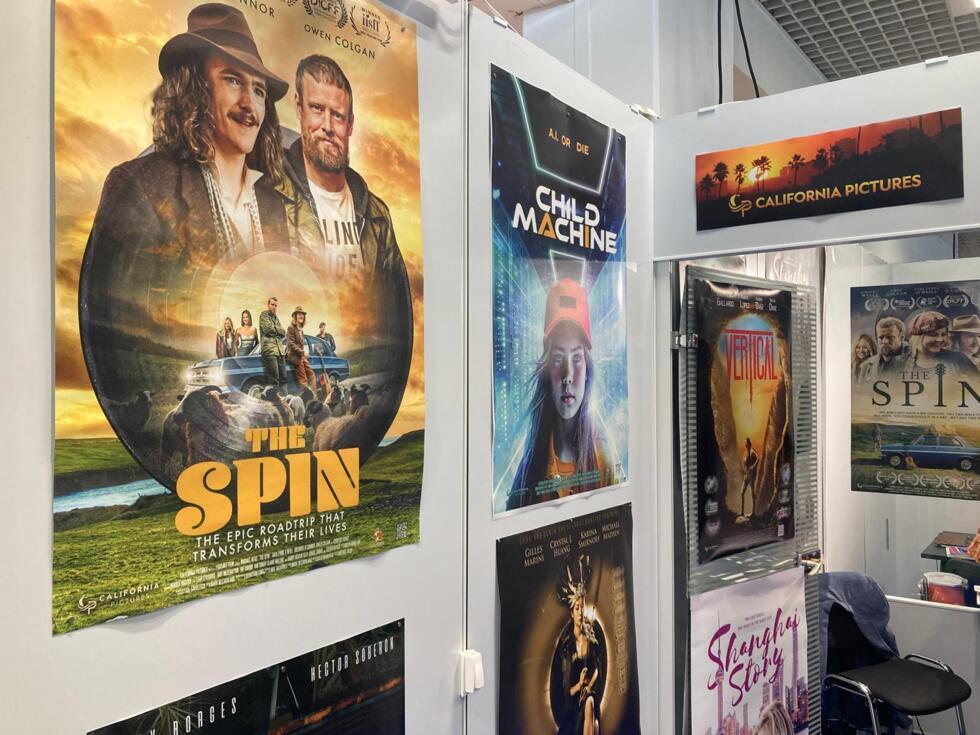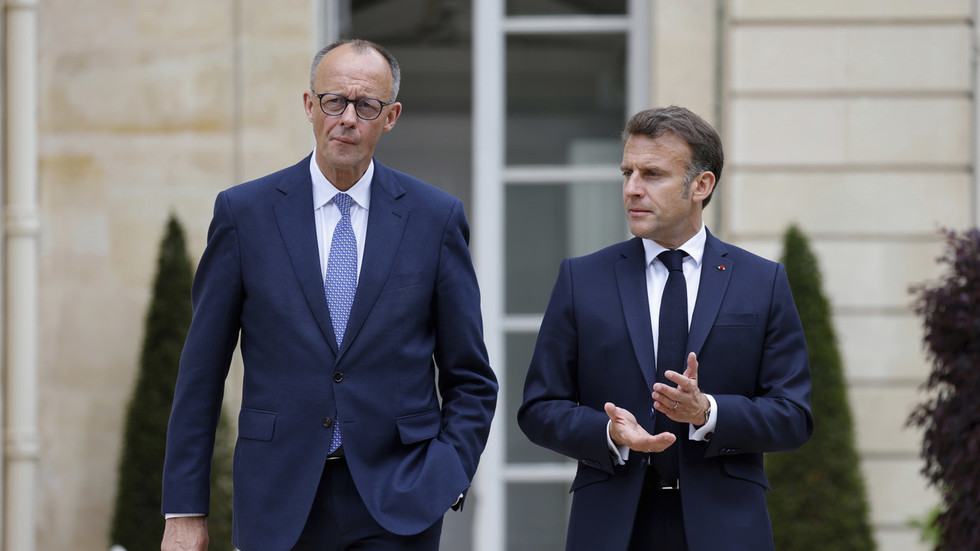The frantic French Riviera gathering typically slows down midway through its second week, when the world’s busiest film market draws to a close and cinema’s dealmakers pack up and head home.
Deep in Cannes’ Palais des Festivals, beneath the iconic red carpet and movie theatres, the film market’s sprawling maze of booths, conference halls and screening rooms was mostly an empty shell by late Wednesday, with only a few diehards holding out.
They included the team from LA-based production and distribution company California Pictures, whose box was still a beehive of activity, decked out with posters for their latest rom-coms, thrillers and sci-fi movies.

“Given the time and money we put into Cannes, we might as well use up every minute of the market,” said Jenniffer Margo Giron, the company’s head of acquisitions and marketing. While her boss has proclaimed this the “best market since Covid”, Margo Giron gave a more cautious assessment, citing uncertainty over Trump’s tariff plans as one factor behind relatively weak demand for indie films.
“Cannes will always be the top venue for our industry. You can’t miss out on the market,” she said. “But nowadays you hear people say they make more money at the nearby casino than selling films here.”
All about Trump
The US president’s threat to drag the movie world into his trade wars has rattled an industry that is still recovering from the Covid-19 shutdown, historic Hollywood strikes and the disruption caused by streaming platforms like Netflix.
Read moreCannes 2025: Cinema urged to ride ‘unstoppable’ AI wave as critics warn of slippery slope
In the run-up to the festival, Trump announced on his Truth Social platform a 100% tariff on all movies “produced in Foreign Lands”. He claimed the US film industry was dying a “very fast death” because an increasing number of filmmakers were shooting in other countries to take advantage of tax incentives or cheaper production costs.
Short on detail, his plans have brought confusion to a market that runs on trust in the industry’s ability to shoot, package and distribute films on time and on budget – and which relies on the Cannes showcase to boost confidence.

At the glitzy Riviera gathering, film workers have made no secret of their frustration at seeing their most important annual rendezvous hijacked by Trump’s America First agenda.
As one executive told The Hollywood Reporter early on in the festival, “We’ve got Tom Cruise on the red carpet in Cannes and all anyone will want to talk about is Trump and tariffs. (...) Once again he’s succeeded in making it all about him.”
Movies stuck in customs
The notoriously politics-averse Cruise steered clear of the subject as he returned to Cannes for his latest installment in the “Mission: Impossible” saga, which was shot in multiple countries all over the world, taking advantage of just the kind of foreign production incentives Trump has in his sights.
Others at the festival have been highly vocal in their criticism of the US president and his plans for the movies. As he picked up a career Palme d’Or on the opening night, screen legend Robert De Niro set the tone with a blistering attack on America’s “philistine” president, urging the industry to join the “fight for democracy”.
To display this content from YouTube, you must enable advertisement tracking and audience measurement.
One of your browser extensions seems to be blocking the video player from loading. To watch this content, you may need to disable it on this site.

10:18
US filmmakers in Cannes have poked fun at the very notion of putting tariffs on moviemaking, questioning the feasibility of Trump’s plans.
“Does that mean you can hold up the movie in customs?” joked Wes Anderson at the press conference for his star-studded competition entry “The Phoenician Scheme”, which was shot at Studio Babelsberg in Germany.
“That's not going to happen, right? The guy changes his mind like 50 times in one day,” added Richard Linklater, whose competition entry “Nouvelle Vague” was shot in France. He praised the French for protecting their film industry with tax breaks and other incentives.
“They make sure it’s healthy, they help it – the government, they’re all in, from production to distribution,” Linklater told reporters. “The US could use a little bit of that.”
‘Cultural war’
While Trump’s tariff threats have spooked Europe, his threats to wage war against EU regulations that protect and promote European cinema have caused even greater alarm.
The regulations take many forms but typically include measures such as taxing cinema tickets to fund independent filmmakers, quotas for European or non-English-language productions, or forcing major studios to fund domestic productions. Trump has described them as “overseas extortion”.
On Sunday, several dozen European filmmakers staged a rally at a beach café on Cannes’ iconic boulevard de la Croisette, where they read a declaration denouncing the “cultural war” waged by the Trump administration. They urged EU decisionmakers not to give up on rules protecting their industry in trade talks with Washington.

“The very survival of Europe’s film industry is at stake here,” said French filmmaker Jérôme Enrico, one of the sponsors of the declaration signed by the likes of Claude Lelouch and Italy’s Paolo Sorrentino.
“We don’t want culture to be treated just like any commodity,” he said. “Yes, it’s an industry, but it’s also an art form, and we can’t treat cinema like cars or steel.”
Korean no-show
The tariff debate has been less of an issue for the Asian film industries that are always a fixture of the Cannes film market. At the South Korean pavilion, Sejeon Hahn of the Korean Film Council (Kofic) pointed to both structural and cultural differences with Europe’s film industry.
“We haven’t developed the same culture of cross-border co-productions as Europe,” she explained. “And we don’t have the same instinct to team up with our neighbours when it comes to resisting America.”
To display this content from YouTube, you must enable advertisement tracking and audience measurement.
One of your browser extensions seems to be blocking the video player from loading. To watch this content, you may need to disable it on this site.

11:44
South Korean cinema is also absorbed by its own problems, Hahn added. For the first time in a quarter of a century, no Korean film has been invited to Cannes’s official line-up this year, in a huge setback for a country that gave us the 2019 Palme d’Or with Bong Joon-ho's “Parasite” and saw Park Chan-wook pick up the Best Director award in 2022 for his “Decision to Leave”.
The Cannes no-show has sparked soul-searching about a business model in which domestic blockbusters crowd out the arthouse films that have made the industry’s global fame, preventing the emergence of new talent.
“We need to question our model, and perhaps open up to international co-productions, so that we bounce back stronger,” said Hahn.
A blessing in disguise?
The mood was more upbeat at the pavilion housing the Agence Culturelle Africaine (ACA), which supports African film projects and is hailing a strong edition for the continent. Its director Aminata Diop Johnson cited the breakthrough success of “My Father’s Shadow” by Akinola Davies Jr, the first Nigerian film to land an official slot in Cannes.
“Having a film in the official selection is a strong incentive for countries to send delegations to the festival and boost investment in their film industries,” she said, pointing to the nearby Nigerian pavilion, the first in Cannes, where a Nigerian government delegation has unveiled plans to turn the country’s bustling movie sector into a global heavyweight.
Read moreCannes 2025: Nollywood basks in spotlight as Nigerian film finally makes the cut
Diop Johnson played down the threat of US tariffs, suggesting it could be a blessing in disguise for emerging film industries.
“After the initial shock of Trump’s announcement, industry workers immediately started looking for other investors,” said the ACA director, who has organised Cannes panels with investors from across the globe. “Reducing our reliance on the US could actually be a good thing.”
Brazil’s ‘Trump imitator’
At farewell drinks hosted by film workers from Brazil, the market’s "country of honour” this year, producers Paula Santos and Lucas Sander drew a parallel between Trump’s protectionist plans for cinema and wider geopolitical shifts currently at play.
“Filmmakers in Brazil traditionally look to the US for investment. But coming to Cannes has put us in touch with film workers from China, Taiwan and other countries, opening up new possibilities," said Sander. “It comes at a time when Brazil is drawing closer to BRICS countries.”

First-timers in Cannes, Santos and Sander have been looking for investors to support their first feature film “Fragilities”, a body-horror. They say a busy week of in-person meetings with industry workers from all continents has made the financial sacrifice worthwhile for their small production company Tauma.
But they remain acutely aware of the political threats weighing over the film world.
“We had our own Trump imitator with (former president) Jair Bolsonaro, who dissolved Brazil’s culture ministry and almost destroyed our film industry,” said Santos, who fears the far-right maverick might one day return to power like his US mentor.
“Trying to put borders in the movie world, like Trump wants to do, is not just bad for our industry,” added Sander. “It’s also a way of attacking culture and diversity.”











 English (US) ·
English (US) ·